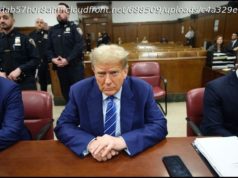The FBI searched Trump’s residence for evidence of violation of the Espionage Act. What is that?
Former president Donald Trump routinely ripped up papers while in office — and upon leaving the White House, took more than a dozen boxes of official records with him to Florida (including documents clearly marked as classified).
Now, as part of a federal investigation, the FBI has conducted a court-approved search of Trump’s residence at his Mar-a-Lago Club, over concern that Trump had not returned all of the documents, The reports.
The search warrant reveals that the FBI found top-secret information there while looking for evidence of the violation of three potential crimes, including part of the Espionage Act.
If Trump were to be charged and found guilty of willfully hiding or destroying confidential and classified materials — a big if — some legal experts say he could be barred from being president again, depending on which law he broke. Other experts disagree.
What we know about the Justice Department probe so far
Earlier this year, the National Archives recovered 15 boxes of White House records from Mar-a-Lago and saw that some of the documents were marked “classified.” The agency asked the Justice Department to investigate, and in April, The Post reported that federal prosecutors were looking into it.
By May, the Justice Department began asking former White House aides about the boxes. They also convened a grand jury, a significant escalation in the investigation, and the grand jury issued a subpoena to learn more. Over the spring, members of Trump’s legal team searched through a storage area and turned over several items that they thought might count as presidential records, Trump lawyer Christina Bobb said.
Then in August came the search at Mar-a-Lago by FBI agents. Government authorities were concerned that Trump had not handed over all the classified material he had taken out of the White House, The Post reported — and they were worried some of the material at Mar-a-Lago related to nuclear weapons.
For the FBI to search someone’s home — let alone a former president’s — requires the government to show an extraordinary amount of evidence that it has reason to believe a crime has potentially been committed. Attorney General Merrick Garland said that he approved the request for a search warrant and that evidence was presented to a federal judge, who signed off on a court order approving the search.
The search warrant, first published by the Wall Street Journal, asked for permission to search “all storage rooms, and all other rooms or areas within the premises used or available to be used by [the former president] and his staff and in which boxes or documents could be stored, including all structures or buildings on the estate.”
FBI agents found and took around 20 boxes of items, including photos, handwritten notes and a pardon for Trump ally Roger Stone, the Wall Street Journal reported. According to the Journal, some of the information stored at Mar-a-Lago was so secret that it’s meant to be reviewed in government-secured facilities.
“These are the types of documents that would make most of us quiver to hold,” said Barbara McQuade, a former U.S. attorney, “let alone retain unlawfully.”
Could Trump, or anyone, be charged with a crime?
Possibly.






